Bachelor parties are a fun way to celebrate the ending of singlehood and the beginning of married life. Some people go absolutely wild in Vegas, some enjoy a quiet celebration with just a few buddies – there are a plethora of ways to have that last ‘huzzah’. Mitch White planned to have a relaxing canoe trip with his closest buddies. The groom-to-be had no idea that this trip would turn into a rescue mission for an elderly dog stuck in the mud. That’s a bachelor party he surely won’t forget.

Image credits: Carver County Sheriff’s Office
One lovely day, Mitch, a young groom-to-be, gathered his closest friends and set out on a canoe trip to celebrate his upcoming marriage. This bachelor party was supposed to be all about nature and bonding. And is there a better way to bond than rescuing a pup together?
Just after the group had lunch and moved on with their journey, Mitch’s nephew, Gaylen Fraenkel, heard a sad barking. They hadn’t encountered anyone, so it was highly unlikely it was some camper’s dog. The young man decided to turn the canoe around to make sure everything was okay. And good thing he did – a desperate dog was stuck in thick mud and using his last bits of strength to call for help.
Upon closer inspection, they saw that the poor fella was an elderly Saint Bernard. He was very thin and exhausted with a nasty tick attached to his eye. The rest of the group turned their canoes around and jumped in to help. The mud was so deep and thick, everyone sunk up to their knees. But they were relentless in their attempt to rescue the dog, using oars as shovels to dig him out.
Mitch White was out on his bachelor party trip with his closest friends. The guys were canoeing when they heard barking
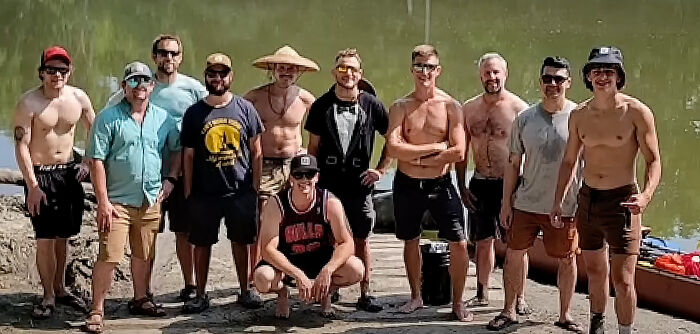
Image credits: WCCO – CBS Minnesota
When they approached the shore they saw a dog asking for help, completely stuck in the mud

Image credits: WCCO – CBS Minnesota
The guys quickly jumped out and started digging him out, using oars as shovels
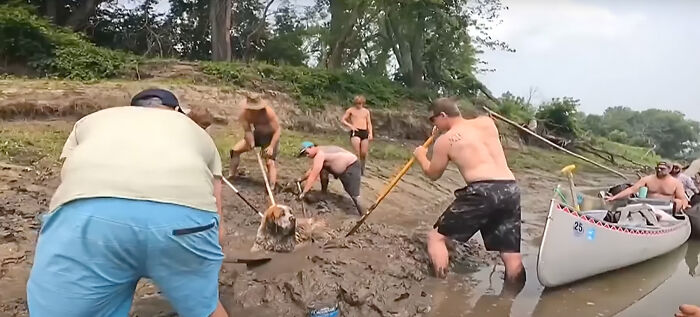
Image credits: WCCO – CBS Minnesota
To keep the pooch comfortable, they offered him water, of which he drank half a gallon before stopping. The kind guys shared their lunch with him, giving him some lunch meat and summer sausages. This quick snack was supposed to give him an energy boost to get up. The bachelors named him Wilson and called out his new name in an attempt to get him up, but he was too tired, even after the delicious summer sausages.
The group didn’t want to approach Wilson too closely as they didn’t see any collar and weren’t sure if he was friendly. That’s a good practice when dealing with a dog you don’t know.
Alex, one of Mitch’s friends, decided it was time to call for help and dialed up 911. He explained the situation and they dispatched the Carver Fire Department, who came to Wilson’s aid in 20 minutes. They brought a harness that they were able to get under his chest and the fire department men, together with two of Mitch’s friends, pulled Wilson out of his muddy prison. Hurray!
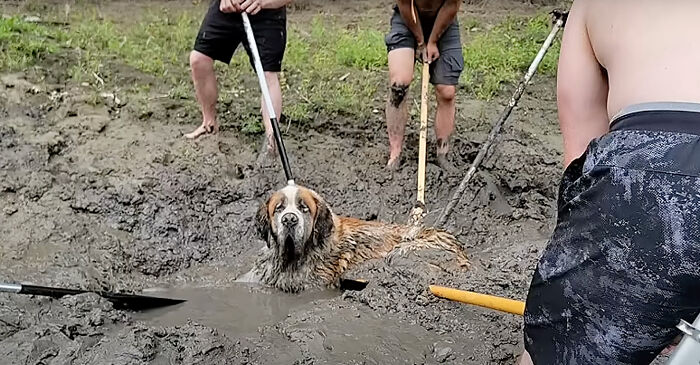
Image credits: WCCO – CBS Minnesota
Thanks to the kindness of the bachelors and help from the local fire department, the adorable pooch was rescued
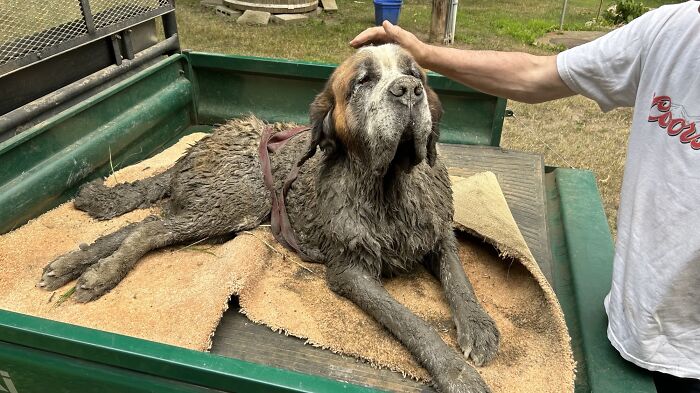
Image credits: Carver County Sheriff’s Office
After a successful rescue mission, Wilson was in for another pleasant surprise. Five minutes after he was pulled out of the mud, his owner showed up. He was surprised to see his four-legged pal all covered in mud. “Ed! What are you doing down there in the mud?!” he exclaimed at the sight of his dog. That’s how Mitch and his friends found out they’d been calling Ed the wrong name. Although he does look like a Wilson to me.
A couple of days ago, Mitch got a pleasant surprise when a friend of the owners reached out to him. He wanted to let Ed’s saviors know that he was doing much better, recovering nicely and was already moving around on his own. I bet his owners won’t let him out of their sight now.
Ed, a lovely senior Saint Bernard, was reunited with his owner and is feeling much better
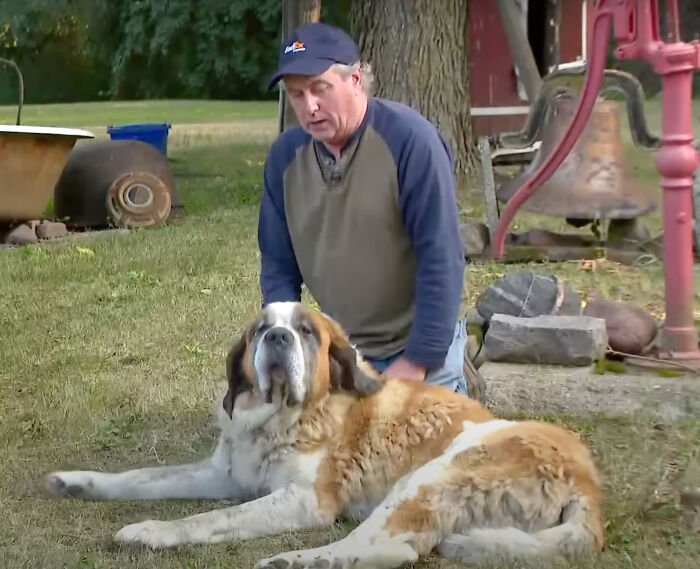
Image credits: WCCO – CBS Minnesota
Adorable Ed was clearly born under a lucky star. Mitch’s party found him just in time to get him to safety. But what if they hadn’t found him?
Owners want the best for their dogs – the best treats, loads of toys and freedom to roam and explore. Unfortunately, letting your dog off the leash can be very dangerous as they can get lost like poor Ed here. They might decide to snack on something dangerous that can result in a stack of medical bills and a long and painful recovery. Keep an eye on your pet to avoid injuries or some malicious person trying to steal your beloved pooch.
Walks with their human are the highlight of any dog’s day and they look forward to it. It’s that one time of the day when they have your undivided attention and love, so try to make the best out of it. Avoid going on your phone or listening to music; instead, try talking to your dog and watch their face light up when you say, ‘hey buddy!’. The more fun activities you do, the stronger the bond you create with your pooch. Look into those eyes and remember that you are everything to them, so make the most of the short time you have together.
People in the comments praised the bachelors for their act of kindness













Sending Belated Birthday Greetings: Expressing Your Good Wishes with a Personal Touch
Living in today’s world, it can be simple to forget about an important occasion like a loved one’s birthday. The fast-paced nature of life, unforeseen circumstances, or even just not remembering can cause us to miss out on commemorating an important day.

Although the birthday may have already passed, it’s never too late to make amends and show your sincerest belated wishes. In this article, we’ll explore how to express your feelings with truthfulness, personalization, and affection.
To begin, you must acknowledge that you missed their special day, but emphasize that it doesn’t diminish its importance in your heart. A heartfelt belated wish can mean just as much as an on-time one, so don’t let lateness prevent you from reaching out.
Think about what makes your relationship with the person unique and use those details to craft a thoughtful message that reflects your shared experiences, inside jokes, or precious memories. Adding a personal touch to your belated birthday wishes shows that you’ve taken the time to reflect on your bond and make your message special.
Choosing the right medium to convey your message is also essential. A handwritten letter or a carefully selected card can serve as tangible keepsakes, while a heartfelt video message adds a personal touch. The medium you select should align with your style and the recipient’s preferences.
Make sure your belated birthday wishes are genuine and express real regret for the delay. Let the person know that they matter to you and that you hold them dear, even if you didn’t acknowledge their special day on time. Your sincerity and the warmth of your words can help make up for the late wishes.
Turn your belated birthday wishes into an opportunity to highlight the positives. Celebrate their achievements, their impact on your life, or the joy they bring to those around them. Remind them of their significance and why they are so special to you. This positive reinforcement can turn a belated wish into a heartfelt celebration.
If possible, plan a special get-together or activity to compensate for the delay. This demonstrates your commitment to creating lasting memories, even if it’s slightly delayed. It shows that you’re willing to make amends and celebrate their special day in a memorable way.
A little bit of humor can also go a long way. Consider adding a well-placed joke or witty comment to your belated birthday wishes to make the person smile and lessen any disappointment from the late wishes. It shows that you can laugh at yourself, and the relationship is strong enough to handle a little lateness.
If you choose to send a gift along with your belated birthday wishes, think about the person’s interests and preferences. A thoughtful gift can show that you’ve put thought and effort into selecting something meaningful. Let this be an opportunity to make up for the late wishes and show that you care.

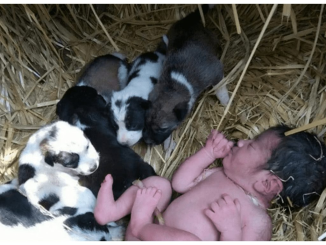
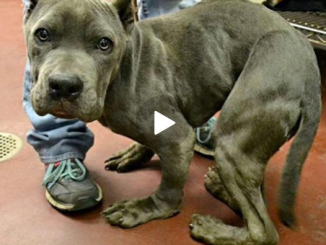
Leave a Reply